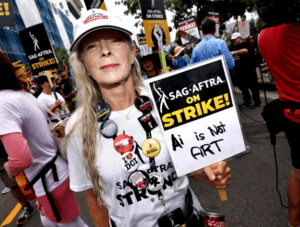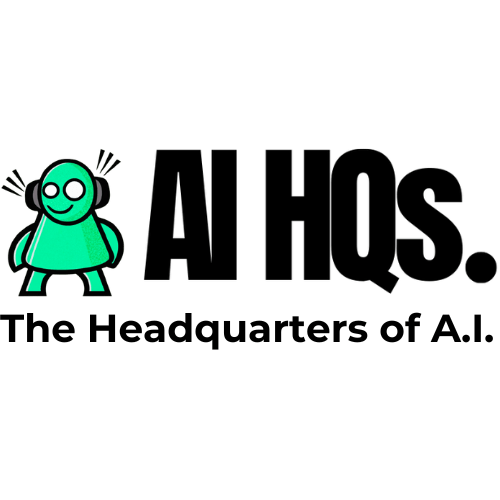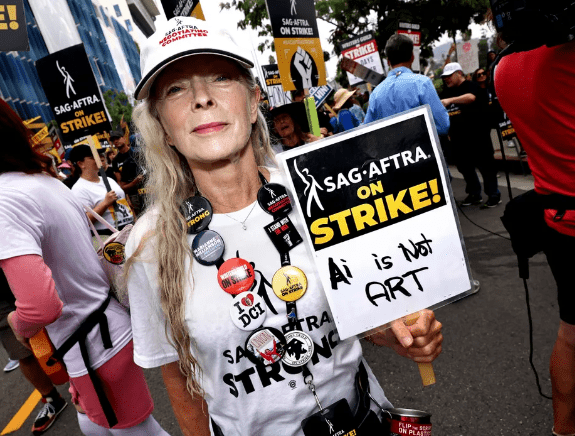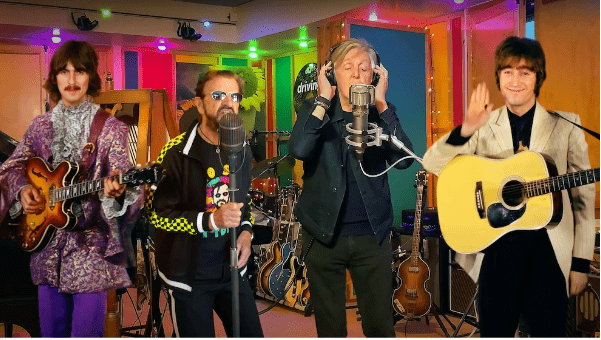Hollywood’s AI Revolution: Unravelling the Impact of Generative AI in the Entertainment Industry
In a groundbreaking development, the Screen Actors Guild-American Federation of Television and Radio Artists (SAG-AFTRA) has officially concluded its nearly four-month-long strike, bringing about a seismic paradigm shift in the entertainment industry. The union’s tentative agreement with Hollywood studios, valued at over $1 billion, not only signifies above-pattern compensation increases but also introduces unprecedented provisions safeguarding members from the looming threat of Artificial Intelligence (AI)..The culmination of Hollywood’s historic strikes has brought forth a transformative era, marked by significant victories and negotiations in the face of an ever-advancing technological landscape. At the heart of this transformative journey lies the complex and contentious issue of artificial intelligence (AI), with actors and writers standing united against the encroachment of generative AI in the creative process.

AI Protections and Generative AI Concerns
One of the most noteworthy aspects of the agreement is its comprehensive stance on the use of artificial intelligence. The deal mandates “informed consent and compensation” for the creation and utilization of digital replicas of both living and deceased union members. This groundbreaking provision addresses concerns about studios using AI scans of performers, a contentious issue that was a significant point of contention during negotiations.
Preceding SAG-AFTRA’s historic deal, the Writers Guild of America (WGA) concluded its own strike, emphasizing protections against the use of generative AI in the writing process. This decision, arrived at after almost five months of negotiations, sets a precedent for how the industry grapples with the integration of AI technologies. WGA’s contract explicitly prohibits the use of generative AI to write or rewrite literary material and ensures writers have the right to refuse AI software.
The two unions, representing the creative forces behind the screen, have taken a united stance against the potential exploitation of AI in the entertainment industry. Both agreements reflect a shared commitment to maintaining the integrity of creative work and ensuring fair compensation for artists in an era dominated by technological advancements.
The strike, initiated by SAG-AFTRA, has reached its conclusion with a resounding 86% approval from the National Board. The deal, now up for ratification, boasts an extraordinary $1 billion package encompassing new wages and benefit plan funding. This monumental achievement reflects the union’s commitment to securing fair compensation in the face of industry transformations.
The Screen Actors Guild-American Federation of Television and Radio Artists (SAG-AFTRA) recently concluded its almost four-month-long strike, securing a groundbreaking deal with Hollywood studios. One of the key battlegrounds in these negotiations was the protection against AI exploitation. The union, representing thousands of actors, fought tirelessly to safeguard members from the potential misuse of generative AI in creating digital replicas and synthetic performers. The union’s President, Fran Drescher, emphasized the importance of AI protections, labeling them as “essential” and stating that without this package, the agreement would be incomplete in terms of member protection. The SAG-AFTRA National Board approved the deal with an overwhelming 86% majority, signaling a unified stance against the looming threat of AI in the entertainment industry.
Preceding SAG-AFTRA’s victory, the Writers Guild of America (WGA) concluded its own strike, underscoring the importance of protections against generative AI in the writing process. The agreement reached with the Alliance of Motion Picture and Television Producers (AMPTP) includes measures to ensure that AI-generated material cannot undermine a writer’s credit or separated rights. Writers can use AI with the company’s consent, but they cannot be compelled to use AI software.
The WGA’s deal serves as a potential blueprint for other content creation industries, establishing a model that prioritizes collaboration between humans and AI. The agreement acknowledges the uncertainty and rapid development of the legal landscape surrounding generative AI, prompting regular meetings to address evolving concerns during the contract’s three-year term.
AI emerged as a pivotal sticking point in negotiations for both actors and writers. Studios initially proposed AI scans of performers, particularly those earning above a certain threshold, which raised concerns about perpetual use without additional compensation or consent, even posthumously. The adjustments made in the language of the proposals indicate a recognition of the need for protections against potential AI exploitation.
The overarching goal of these agreements is to strike a balance between harnessing the benefits of AI as a creative tool and ensuring the protection and fair compensation of actors and writers. The union members, including high-profile individuals like Billy Porter, Jennifer Beals, Sean Astin, and Sharon Stone, played a crucial role in shaping the outcome of these negotiations.
The Entertainment Industry’s AI Landscape: Past, Present, and Future
As Hollywood emerges from the shadows of prolonged strikes, the industry faces a transformed landscape, navigating the intersection of creativity and technological advancements. The agreements reached by SAG-AFTRA and WGA set the stage for addressing the impact of AI not only on actors and writers but on the broader creative workforce.
While the deals provide essential protections against AI encroachment, it’s clear that this is just the beginning of the industry’s engagement with generative AI. The contracts acknowledge the fluidity of the legal and technological environment, signaling the need for ongoing dialogue and adaptation to the evolving challenges posed by AI.
Conclusion: Shaping the Future of Entertainment with Responsible AI Practices
In the wake of Hollywood’s historic strikes, the agreements forged with a focus on AI protections signal a commitment to shaping the future of entertainment responsibly. The united front presented by SAG-AFTRA and WGA against AI exploitation sets a precedent for other creative industries grappling with the integration of advanced technologies.
As the entertainment industry embraces the potential of AI, the emphasis on informed consent, fair compensation, and the prohibition of AI-generated material undermining human creativity paves the way for a balanced and innovative future. The journey from strike lines to groundbreaking agreements reflects not only the resilience of creative professionals but also the industry’s recognition of the imperative to navigate the AI revolution responsibly and collaboratively. for all my daily news and tips on AI, Emerging technologies at the intersection of humans, just sign up for my FREE newsletter at www.robotpigeon.beehiiv.com


